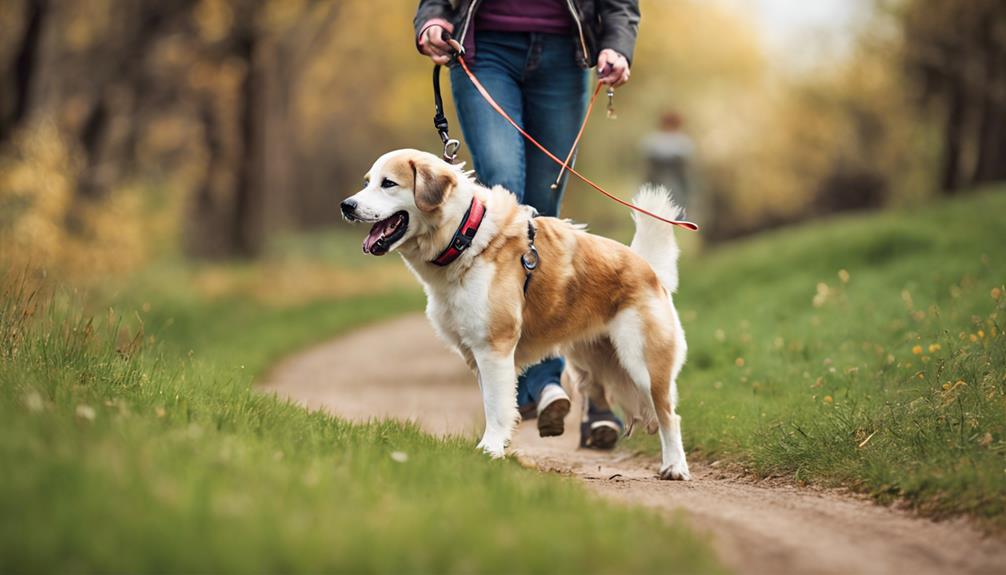Delphinium plants can harm dogs, causing symptoms like drooling, seizures, and paralysis due to toxic alkaloids. Urgent vet help is essential if ingestion occurs. Treatments include symptom management and supportive care. Symptoms of poisoning include heart issues, weakness, and organ failure, requiring immediate veterinary care. Diagnosis involves exams and treatment can include IV fluids and oxygen therapy. To prevent poisoning, keep delphinium plants away, and train dogs to avoid them. Recovery may include a specific diet plan and monitoring. Costs for treatment range from $300 to $6,000. Follow safety tips to protect pets. More information on this topic is available within the outlined sections.
Key Takeaways
- Delphinium plants contain toxins causing symptoms like paralysis and seizures in dogs.
- Immediate veterinary attention is crucial upon ingestion to manage symptoms effectively.
- Diagnosis involves physical exams, urinalysis, and imaging for proper treatment.
- Treatment includes IV fluids, oxygen therapy, and antidotes like physostigmine.
- Prevent ingestion by keeping delphinium out of reach, supervising dogs, and seeking veterinary advice.
Delphinium Toxicity in Dogs
Delphinium plants pose a significant threat to dogs due to their toxic nature containing diterpene alkaloids that can induce neuromuscular paralysis. These beautiful flowering plants, commonly found in gardens, can be extremely harmful if ingested by our canine companions. The toxic compounds present in delphinium can lead to a range of symptoms in dogs, including constipation, drooling, muscle tremors, weakness, seizures, and in severe cases, even death. It's essential for pet owners to be aware of the dangers these plants pose to their furry friends.
If a dog ingests delphinium, prompt veterinary attention is crucial. There's no specific antidote for delphinium toxicity, so treatment focuses on managing symptoms and providing supportive care. Without proper intervention, delphinium ingestion can result in organ failure, heart rhythm irregularities, and ultimately, death. Hence, it's important to seek professional help if there's any suspicion of delphinium poisoning in a dog. Our beloved pets deserve to be kept safe from such potential hazards in their environment.
Symptoms of Delphinium Poisoning

When a dog ingests delphinium, we might observe symptoms like excessive salivation, heart irregularities, constipation, organ failure, and even the risk of death.
These plants contain substances that block nerve signals, causing weakness and paralysis in affected dogs.
Seeking immediate veterinary care is crucial if you suspect your pet has consumed delphinium, as even without visible symptoms, the effects can be severe.
Common Poisoning Signs
Experiencing symptoms of delphinium poisoning in dogs can be a serious and alarming situation for pet owners. Common signs of Delphinium Poisoning in dogs include excessive salivation, heart irregularities, organ failure, weakness and paralysis due to the presence of diterpene alkaloids. It is crucial to seek immediate veterinary care if your dog shows any of these symptoms, as even small amounts of delphinium can be poisonous. Below is a table summarizing the common poisoning signs in dogs:
| Common Poisoning Signs | Delphinium Poisoning in Dogs |
|---|---|
| Excessive Salivation | Heart Irregularities |
| Organ Failure | Weakness and Paralysis |
| Urgent Veterinary Attention | Small Amounts |
Immediate Veterinary Attention
Upon observing any of the symptoms of delphinium poisoning in dogs, immediate veterinary attention is necessary to address the potential dangers posed by the toxic alkaloids present in the plant. Dogs affected by delphinium poisoning may exhibit signs such as excessive salivation, heart irregularities, constipation, and even organ failure, which could lead to death. Delphinium plants contain diterpene alkaloids that interfere with nerve signals, causing weakness and paralysis.
Even if symptoms aren't yet visible, ingesting any amount of delphinium can be hazardous to your pet. Veterinary care may involve administering IV fluids, oxygen therapy, and antidotes like physostigmine to counteract the effects of the poison. Failure to seek prompt veterinary care could result in severe consequences, including irreversible organ failure.
Diagnosis and Treatment for Dogs
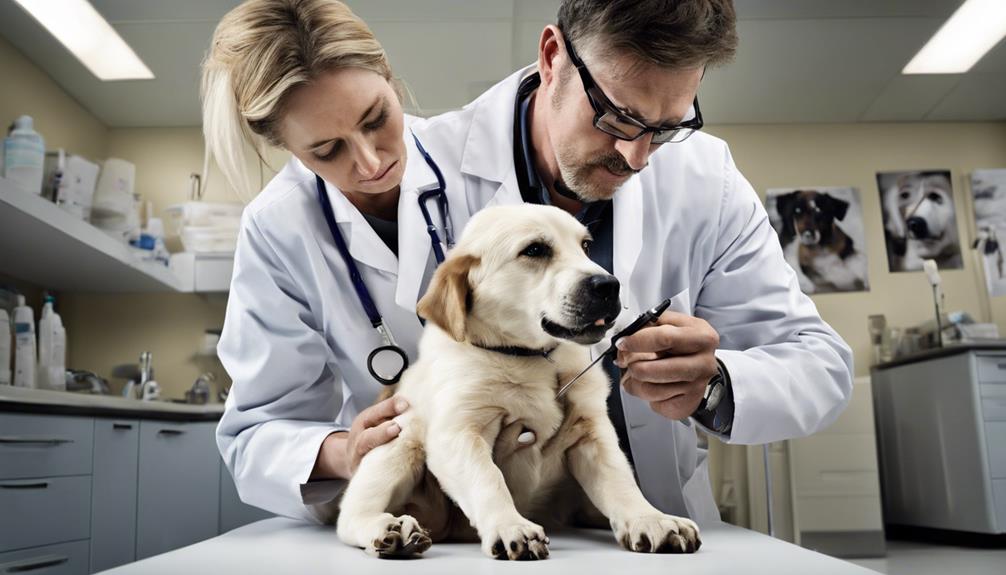
To diagnose delphinium poisoning in dogs, veterinarians perform a thorough physical examination and utilize diagnostic tools such as urinalysis, blood tests, X-rays, CT scans, ultrasound, and MRI if necessary. Once the diagnosis is confirmed, treatment for delphinium poisoning in dogs typically involves administering IV fluids, oxygen therapy, and antidotes like physostigmine, atropine, or muscle relaxants. The duration of observation and treatment varies depending on the severity of symptoms and the concentration of alkaloids present in the dog's system.
Here is a table summarizing key points about the diagnosis and treatment of delphinium poisoning in dogs:
| Aspect | Details |
|---|---|
| Diagnosis | Physical exam, urinalysis, blood tests, imaging (X-rays, CT scans, ultrasound, MRI) |
| Treatment | IV fluids, oxygen therapy, antidotes (physostigmine, atropine, muscle relaxants) |
| Observation Duration | Varies based on symptom severity and alkaloid concentration |
Immediate veterinary care is essential in cases of delphinium poisoning, as large ingestions can be fatal even with treatment. With prompt intervention, follow-up care, a specific diet plan, and post-treatment symptom monitoring, dogs can recover from delphinium poisoning and regain their health.
Understanding Delphinium Poisoning Risks

Understanding the risks associated with delphinium poisoning in dogs is vital for pet owners to protect their furry companions' well-being.
The delphinium plant contains diterpene alkaloids that are harmful to dogs, leading to neuromuscular effects upon ingestion. Symptoms of delphinium poisoning may include excessive salivation, heart irregularities, constipation, and potential organ failure.
Even if your dog shows no immediate signs of poisoning, seeking veterinary care is essential due to the high toxicity levels of the plant. It's crucial to highlight that even small amounts of delphinium can be hazardous for dogs, underscoring the need for caution.
In cases of delphinium ingestion, prompt veterinary intervention is necessary. Treatment often involves administering IV fluids to flush out the toxins and providing oxygen therapy to support your dog's respiratory system.
Preventing Delphinium Ingestion in Dogs

How can dog owners effectively prevent delphinium ingestion in their furry companions?
To safeguard your pets from the dangers of toxic plants like delphinium, it's essential to take proactive measures.
To start with, keep delphinium plants out of your dog's reach by placing them in elevated areas or behind barriers. Additionally, store delphinium seeds and parts securely to prevent accidental exposure.
Supervision is key – always monitor your dogs in areas where toxic plants are present, redirecting their attention if they show interest. Training plays a vital role in preventing ingestion; teach your dogs to avoid consuming any plant material, emphasizing the importance of plant safety.
For expert guidance tailored to your specific situation, consult a veterinarian. They can provide valuable advice on creating a safe environment for your dogs around delphinium plants.
Delphinium Toxicity: Veterinary Insights

When a dog ingests delphinium plants, it can experience a range of symptoms like weakness, seizures, and even death due to the toxic compounds present.
Veterinary care is vital in these situations since there's no specific antidote for delphinium poisoning in dogs.
Treatments may involve IV fluids, oxygen therapy, and other supportive measures to help the dog recover from the effects of delphinium toxicity.
Symptoms in Dogs
Symptoms of delphinium toxicity in dogs can manifest as excessive salivation, heart irregularities, constipation, organ failure, and even the risk of death. These symptoms occur due to the presence of toxic diterpene alkaloids in all species of delphinium.
Dogs may experience neuromuscular paralysis, leading to weakness and muscle tremors. When these signs are observed, prompt veterinary intervention is essential. Without a specific antidote for delphinium poisoning, treatments such as IV fluids and physostigmine are often administered to aid in recovery.
Recognizing these symptoms early and seeking veterinary care can make a significant difference in the outcome for dogs affected by delphinium toxicity.
Treatment Options
For the successful treatment of delphinium toxicity in dogs, immediate veterinary intervention is essential. IV fluids and oxygen therapy are commonly used to stabilize the dog's condition. Antidotes like physostigmine may be administered to prevent further muscle absorption of the poison.
Since respiratory issues can arise, overnight observation is paramount to monitor the dog's progress. The cost of treatment for delphinium poisoning can be covered by pet insurance, making it easier for pet owners to afford the necessary care.
Managing Delphinium Poisoning Cases
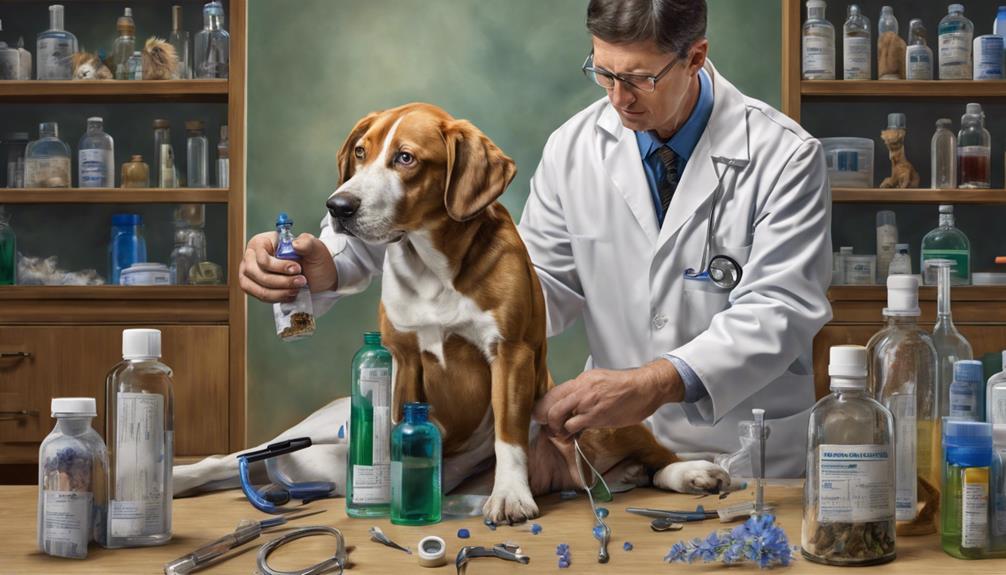
Managing cases of delphinium poisoning in dogs requires immediate veterinary intervention to ensure prompt treatment and recovery. Delphinium poisoning can present symptoms such as excessive salivation, heart irregularities, constipation, and organ failure, potentially leading to fatality.
The cost of treating this poisoning varies from $300 to $6,000, with an average of $1,200. Upon ingestion, even small amounts of delphinium can be dangerous, necessitating urgent veterinary care.
Treatment for delphinium poisoning typically involves administering IV fluids, oxygen therapy, and an antidote such as physostigmine to counteract the poison's effects. Ensuring the recovery of a dog poisoned by delphinium includes following a veterinarian's prescribed diet plan, providing cage rest, and monitoring for any recurring symptoms post-treatment, with an average cost of $1,200.
Timely and thorough veterinary care is crucial in managing delphinium poisoning cases to facilitate the best chances of successful recovery for our furry companions.
Delphinium Poisoning Recovery Process
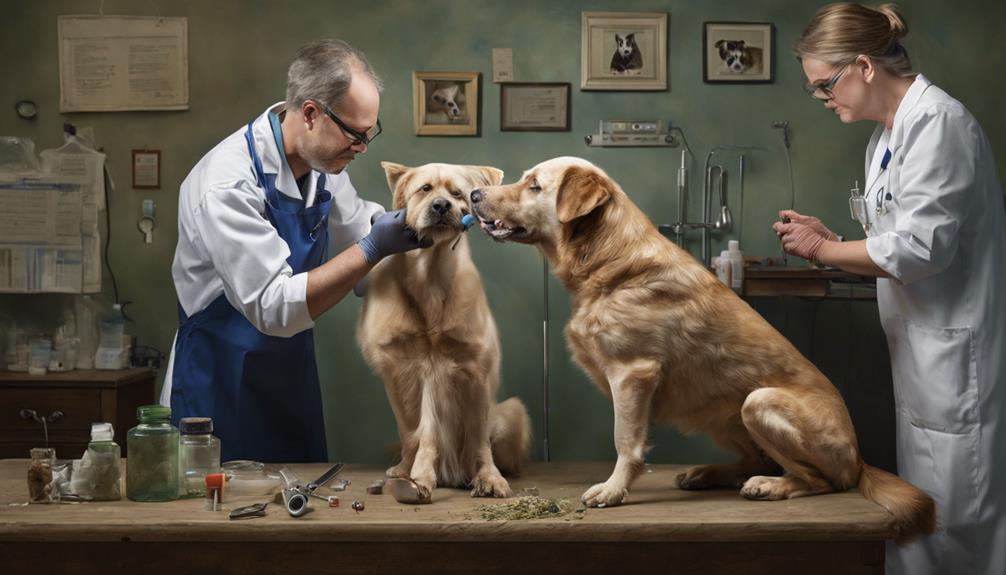
After surviving delphinium poisoning, dogs benefit from following a prescribed low-fat and oil diet plan for their recovery process. During this critical period, it's essential to provide the necessary care for your furry friend. Here are some key steps to aid in your dog's recovery:
- Adhere to the veterinarian's diet plan: Make sure your dog receives the correct nutrients to aid in their recovery.
- Allow for cage rest: Giving your dog a few days of rest in a comfortable environment can help them recuperate.
- Schedule follow-up appointments: Regular check-ins with the veterinarian are crucial to address any lingering symptoms post-treatment.
- Monitor for signs of relapse: Keep a close eye on your dog for any indications of the poisoning returning.
- Be alert for persistent symptoms: If your dog continues to display symptoms, consult your veterinarian promptly.
Delphinium Poisoning Costs and Considerations
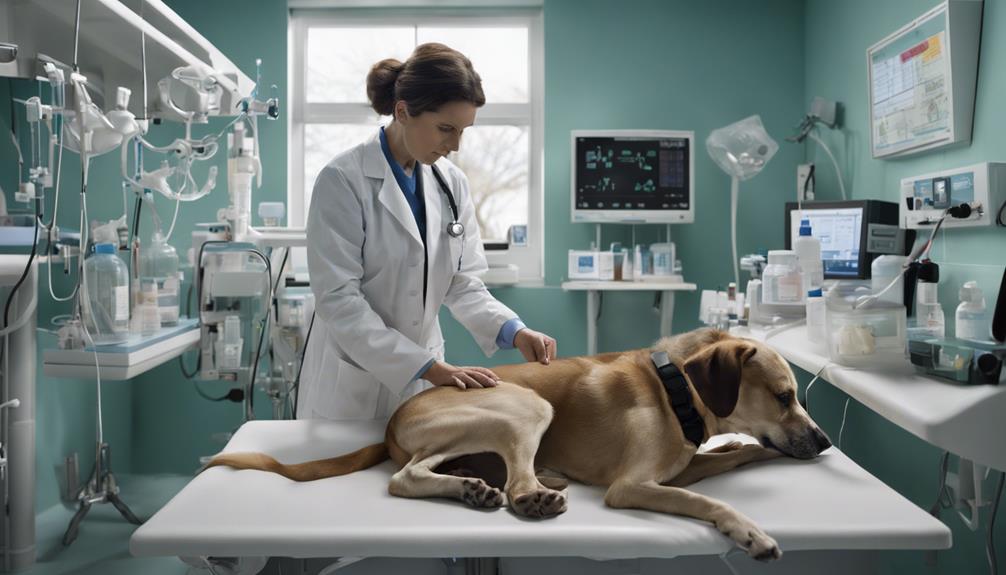
Upon recovery from delphinium poisoning, understanding the potential costs and considerations associated with treatment becomes essential for pet owners. Delphiniums are poisonous to our furry friends, and if dogs eat this toxic plant, it can cause severe effects on their gastrointestinal tract, leading to symptoms like vomiting, diarrhea, and heart rhythm irregularities.
The average cost of treating delphinium poisoning ranges from $300 to $6,000, with an average cost of $1,200. Immediate veterinary care is vital as the effects of the alkaloids can vary, requiring treatments such as IV fluids and oxygen therapy. In some cases, the administration of an antidote like physostigmine may be necessary.
It's important to consult with a veterinarian if your pet shows any symptoms of delphinium poisoning, as following a proper treatment plan is essential for their recovery. Pet insurance may help cover some of the treatment costs, but ensuring your pet's health and safety should always be the top priority.
Delphinium Safety Tips for Pet Owners

To guarantee the well-being of our furry companions, understanding key safety tips when it comes to delphinium plants is crucial. Here are some important safety tips for pet owners:
- Keep delphinium plants out of reach: Make sure that delphinium plants are placed in areas inaccessible to your dogs to prevent accidental ingestion.
- Learn to identify delphinium: Familiarize yourself with the appearance of delphinium plants to quickly recognize and remove them if needed.
- Monitor your dog's behavior: Keep an eye on your dogs for any unusual symptoms like drooling, weakness, or seizures that could indicate delphinium toxicity.
- Seek immediate veterinary care: If you suspect that your dog has ingested delphinium or is showing symptoms of poisoning, seek prompt veterinary attention.
- Educate others: Share information about the dangers of delphinium toxicity with fellow pet owners to raise awareness and prevent incidents in the community.
Frequently Asked Questions
How Much Larkspur Is Toxic to Dogs?
Ingesting even small amounts of Larkspur (Delphinium) can be toxic to dogs. The critical effects can vary based on the concentration of alkaloids in the plant, leading to symptoms like vomiting, diarrhea, weakness, and potential organ failure.
Veterinary care is essential, even without visible symptoms. Immediate treatment may involve IV fluids, oxygen therapy, and specific antidotes.
Delphinium can be dangerous to dogs, so caution is essential.
What Part of Delphinium Is Toxic?
When it comes to delphinium plants, all parts are toxic to dogs. The flowers, leaves, and especially the seeds contain harmful toxins. Ingesting any of these parts can lead to severe poisoning in our furry friends.
What Is the Most Toxic Plant to Dogs?
The most toxic plant to dogs is delphinium. This plant contains diterpene alkaloids that can cause severe poisoning.
Symptoms of delphinium poisoning in dogs include weakness, paralysis, excessive salivation, heart irregularities, constipation, organ failure, and potentially death.
All species of delphinium are dangerous for dogs if ingested.
Immediate veterinary care is essential, involving IV fluids, oxygen therapy, and specific antidotes to counteract the toxic effects.
Are Purple Delphiniums Poisonous?
Yes, purple delphiniums are poisonous to dogs. Ingesting them can lead to serious health issues like weakness, tremors, and paralysis.
These toxic flowers can even cause organ failure and death in dogs. If a dog consumes purple delphiniums, prompt veterinary treatment is essential to prevent severe consequences.
It's important to keep these harmful plants out of reach of our furry friends to keep them safe and healthy.
Can Delphinium Poisoning in Dogs Be Similar to Peanut Allergies in Cats?
Delphinium poisoning in dogs can be similar to peanut allergies in cats. Both can result in severe allergic reactions. However, it’s important to understand the truth about peanuts and cats. While some cats can be allergic to peanuts, it’s not a common occurrence. It’s always best to consult a veterinarian for proper diagnosis and treatment.
Conclusion
To wrap up, it's essential for pet owners to be mindful of the hazards of delphinium poisoning in dogs. By identifying the symptoms, seeking immediate veterinary care, and implementing preventive measures, we can safeguard our furry friends from potential harm.
Remember to keep these lovely flowers out of reach and always prioritize your pet's safety. Stay informed and proactive to guarantee a happy and healthy life for your canine companions.






